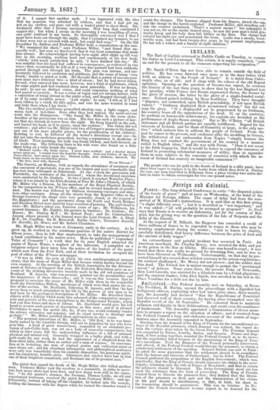IRELAND.
The Earl of Carlisle returned to Dublin Castle on Tuesday, to resume his duties as Lord-Lieutenant. This return, it is sagely remarked, "puts an end for the present to all the rumours respecting his resignation.'
Mr. Smith O'Brien has not been able to remain outside the field of politics. He has come forward once more as in the days before 1848 with an address "to the People of Ireland." It is dated from Cahirmoyle also, as of old; and it rings with the echoes of the old Repeal agitation. Opening on the question of Income-tax repeal, he reviews the history of the last three years, to show that by the war England lost her prestige, while France and Russia augmented theirs, the former by the glory of success the latter by the glory of a single-handed resistance. Ireland gained nothing by those hostilities. They have brought "disgrace, not unmerited, upon British generalship, if not upon British valour." "Irishmen displayed their accustomed velour," but did not reap the glory. "If a disgraceful act be perpetrated by an Irishman, his country bears all the opprobrium of the deed. If, on the con he perform an honourable achievement, his exploits are heralded as the performance of Anglo-Saxon energy." But to Mr. O'Brien "all British statesmen and all British parties are equally indifferent. Regard for the interests of Ireland, and for those of humanity at large, is the only motive" which induces him to address the people of Ireland. From the past he comes to the present, and condemns alike the meddling in Greece, the withdrawal of our ambassador from Naples "simply because the King does not conduct the government of his countrj in a manner suited to English ideas," and the war with Persia. "Does it not occur to the Irish taxpayers, that it would be better to expend the resources of Ireland in promoting substantial measures of utility, than to squander them in wars relative to the concerns of countries with which the interest of Ireland has scarcely an imaginable connexion ?"
The people who ran for gold in the South of Ireland in a silly panic, have since been eager to replace it in the banks from which they drew it. During the run, one man travelled to Kilkenny from a place twenty-two miles distant in order to obtain sovereigns for two one-pound notes.
































 Previous page
Previous page